Key takeaways:
- Pro-life advocacy emphasizes the value of every human life and the importance of empathy in personal connections with individuals facing challenging decisions.
- Advocacy training is essential for developing effective communication skills, emotional intelligence, and the ability to navigate difficult conversations.
- Building coalitions and sharing personal stories enhance the advocacy effort, demonstrating the power of collaboration and relatable narratives.
- Essential skills for advocates include active listening, clarity in messaging, and self-advocacy to prevent burnout and maintain passion for the cause.
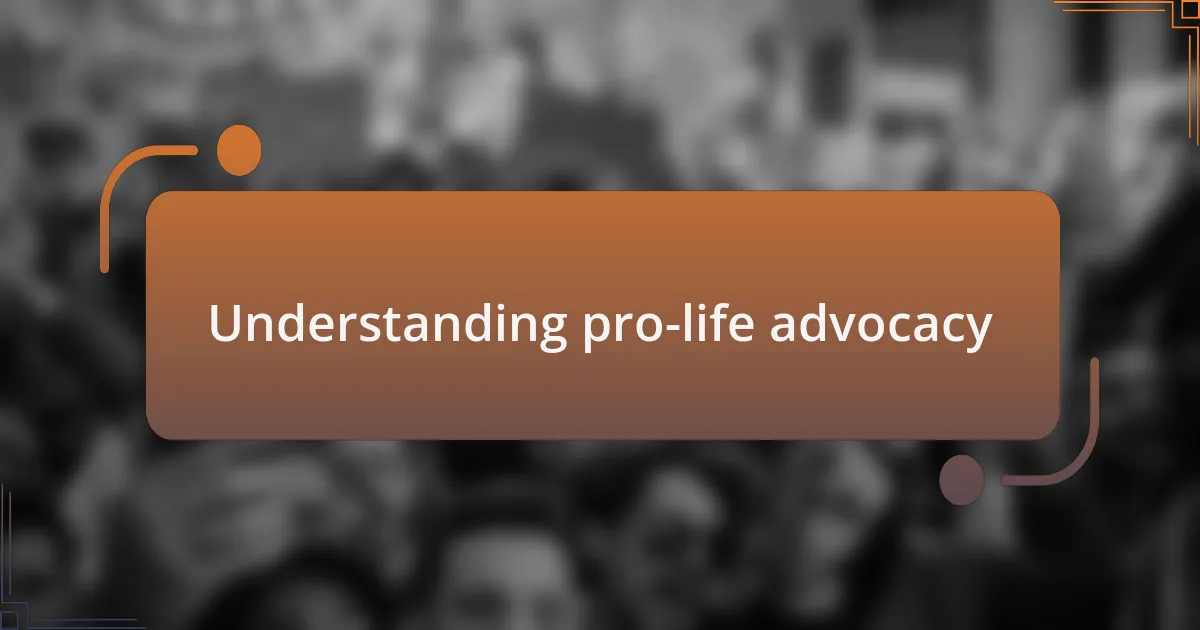
Understanding pro-life advocacy
Pro-life advocacy is rooted in the belief that every human life, from conception to natural death, holds immense value. I remember attending my first advocacy training session and feeling a wave of passion wash over me as I listened to shared stories of women who’ve faced challenging decisions. How could I not be moved by the reality that many people simply don’t understand the profound impact of those choices?
Engaging in this advocacy is not just about policies or legislation; it’s about connecting with individuals on a personal level. I often find myself reflecting on the moment when a fellow advocate shared her own story of unexpected pregnancy. Her vulnerability sparked a conversation that resonated deeply, reinforcing the importance of empathy in our mission. Aren’t we all motivated by a desire to support, rather than judge, those in difficult situations?
What strikes me most is the diverse backgrounds and experiences shared by advocates united in a common cause. I once chatted with a woman who had chosen adoption years ago, and her hope for a world that values life was palpable. This shared mission challenges me to rethink what it truly means to advocate—it’s about compassion, education, and creating a safe space for dialogue. How can we cultivate understanding in a world where these conversations often seem polarized?
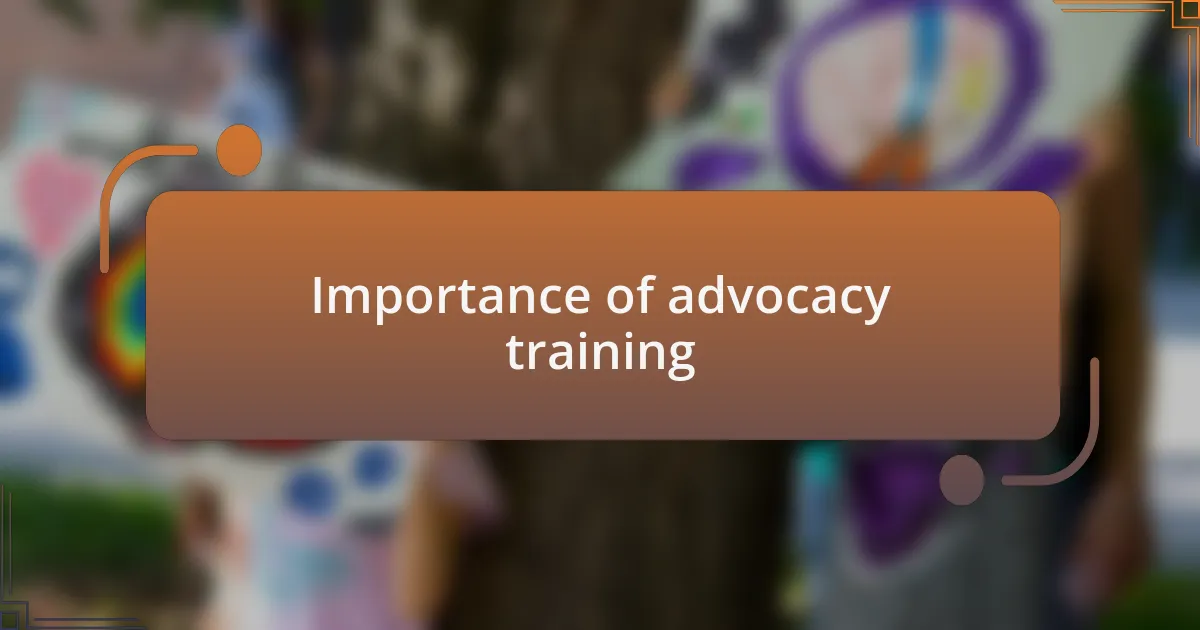
Importance of advocacy training
Advocacy training is pivotal because it equips individuals with the essential skills to communicate effectively and persuasively. I still recall a training workshop where we practiced addressing tough questions about our pro-life stance. The courage it takes to articulate our beliefs in a thoughtful manner is something that I have discovered is crucial for fostering meaningful discussions.
Moreover, understanding the nuances of this advocacy helps advocates build confidence in their approach. I often think back to a time when I hesitated to speak up during a public debate. That moment taught me that without adequate training, I risked missing an opportunity to share my convictions and support others who felt similarly silenced. How can we expect to influence opinions if we aren’t prepared to navigate difficult conversations?
Lastly, advocacy training emphasizes the importance of emotional intelligence, enabling us to connect deeply with others. I remember a panel discussion where an experienced advocate shared her journey, highlighting the importance of listening before speaking. It struck me then that to truly impact lives, we must first seek to understand them. Isn’t that the essence of compassion in advocacy?
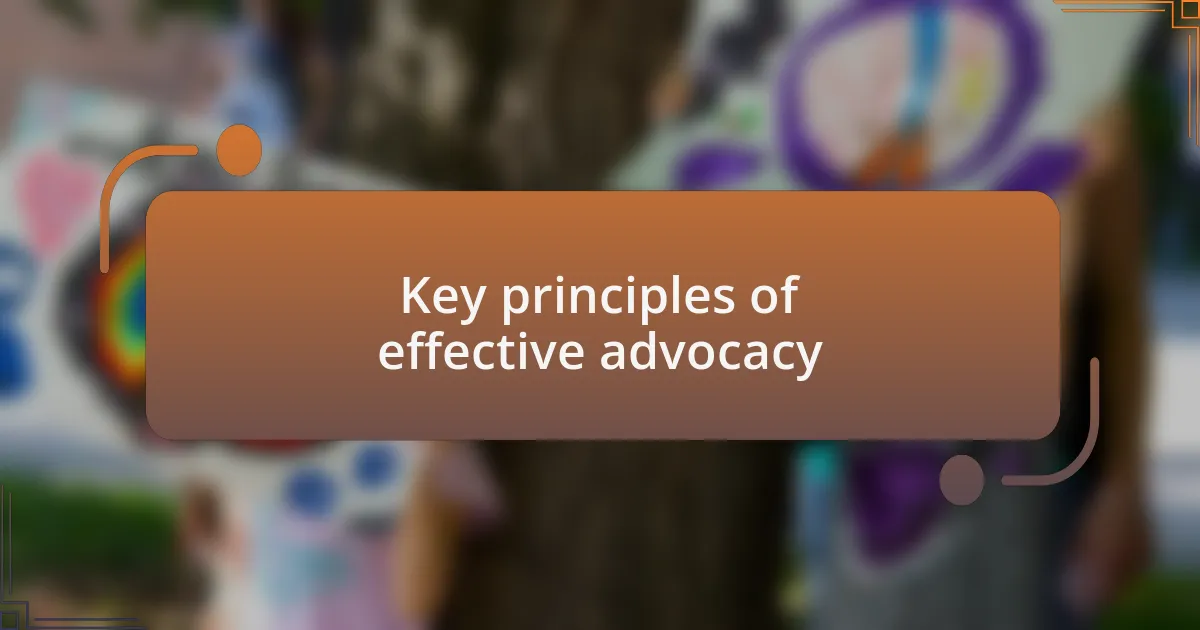
Key principles of effective advocacy
Effective advocacy hinges on clear communication. During one of my advocacy training sessions, I had a chance to witness the power of storytelling. I shared a personal experience that illustrated the profound impact of a supportive community on the lives of individuals facing unplanned pregnancies. I could see the room shift; suddenly, my audience was not just hearing facts but connecting emotionally with a real story. This taught me that conveying information through relatable narratives resonates more deeply than mere statistics ever could.
Another principle I embraced is the importance of building coalitions. A memorable moment for me was when I collaborated with a diverse group of advocates who each brought their unique perspectives to the conversation. We discovered that we could amplify our voices much more effectively together than apart, demonstrating that unity among varying viewpoints strengthens our overall mission. Isn’t it fascinating how collaboration can transform our approach and broaden our reach?
Lastly, I’ve learned that advocacy is an ongoing journey of education and adaptation. I recall a time when I faced backlash after a presentation. Rather than becoming defensive, I took it as a learning opportunity. Engaging with critics and understanding their concerns allowed me to refine my message. This experience reinforced the notion that effective advocacy requires resilience and a willingness to adapt our strategies based on feedback. How can we expect to grow unless we’re open to learning from every interaction?
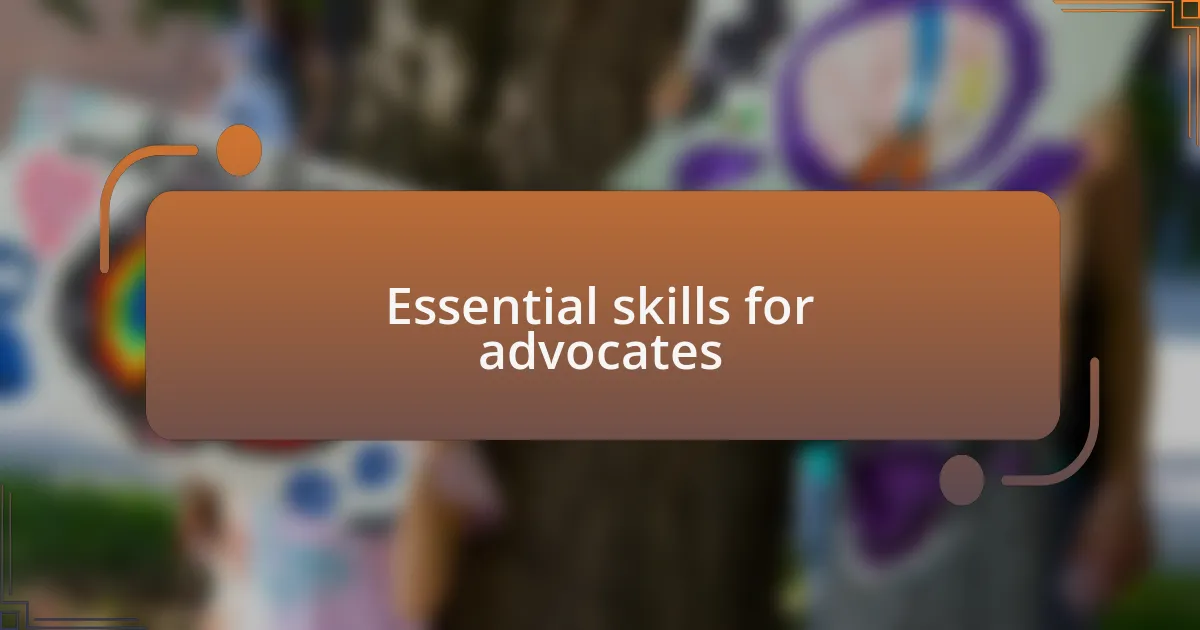
Essential skills for advocates
Effective advocates must master the skill of active listening. I remember attending a town hall meeting where passionate voices clashed. Instead of jumping in with my own opinions, I focused on truly understanding the concerns of others. This shift not only fostered an atmosphere of respect but also led me to discover common ground that I hadn’t previously considered. Have you ever paused to listen deeply? It can transform a debate into a constructive dialogue.
Another essential skill is the ability to articulate your message succinctly. One memorable instance was when I had the chance to speak at a community event. I had only two minutes to convey my stance on a crucial issue. By honing my message down to its core essence, I captured the audience’s attention and generated thoughtful discussions afterward. It made me realize that clarity and brevity can make a significant impact—sometimes less really is more.
Finally, I’ve found that self-advocacy is just as important as advocating for others. Early in my journey, I hesitated to share my own needs, fearing it would seem selfish. But I learned that without advocating for myself, I risked burning out and losing my passion for the cause. Embracing this personal need not only empowered me, but also set an example for others. How can we effectively uplift others if we don’t first take care of ourselves?
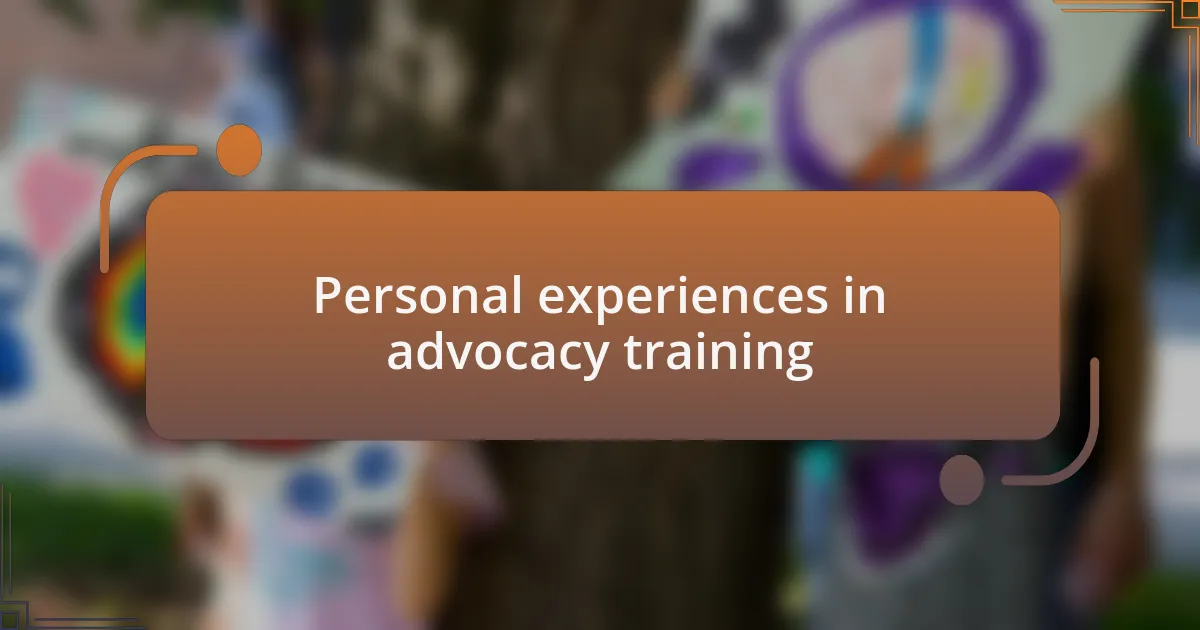
Personal experiences in advocacy training
One afternoon during a workshop on public speaking, I was encouraged to share my personal story related to pro-life advocacy. Standing in front of a supportive group, I felt a wave of vulnerability but also immense strength as I spoke. That experience taught me that sharing our own narratives can build powerful connections and invite others to open up as well. Have you ever felt the courage that comes from being fully authentic?
In a different training session focused on coalition building, I connected with individuals from various backgrounds. It was eye-opening to hear different perspectives on the same cause I cared about deeply. As I listened, I realized that advocacy is often about more than just our views—it’s about embracing a diverse array of voices and working together toward a common goal. Have you ever discovered unexpected allies in your advocacy journey?
Reflecting on a role-playing exercise where we simulated challenging conversations, I learned how to maintain composure under pressure. It was a struggle, especially when faced with opposing viewpoints, but it became a vital moment of growth for me. I learned that staying calm and respectful fosters a more productive exchange rather than letting emotions dictate the discussion. How have your experiences prepared you to handle tough conversations?
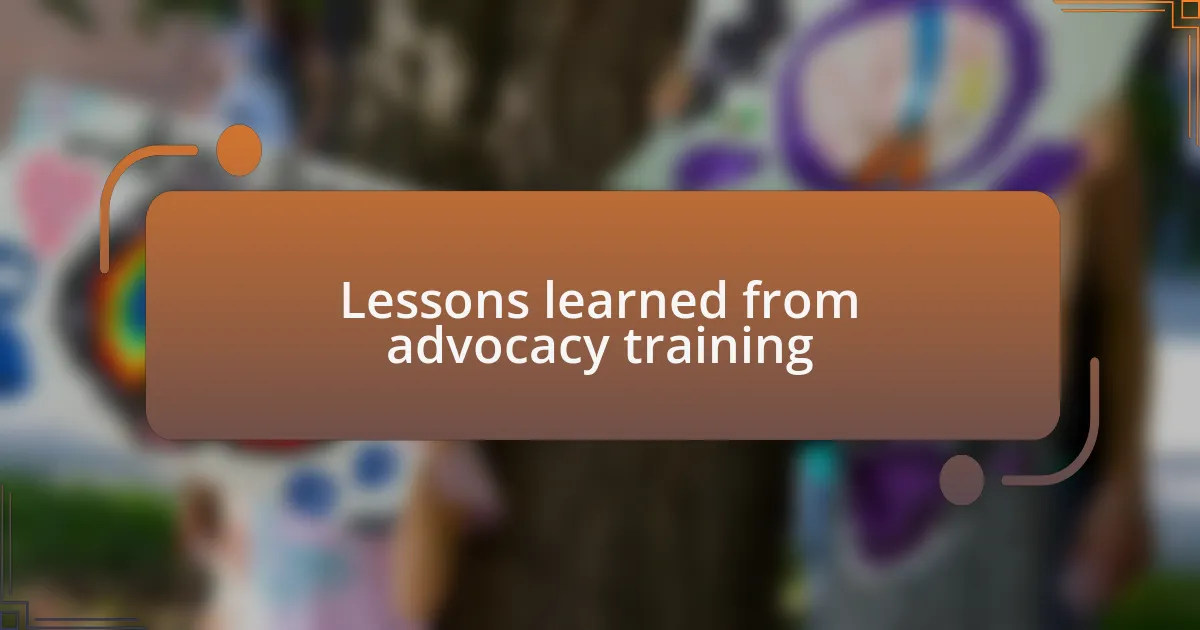
Lessons learned from advocacy training
The training opened my eyes to the power of effective messaging. I remember a session where we crafted talking points tailored to different audiences. It struck me how crucial it is to know your audience—what resonates with them can make all the difference. Have you ever shifted your approach based on who you’re speaking to, realizing that a simple change in wording can lead to a deeper understanding?
In another session, we delved into the importance of empathy in advocacy. I shared a moment when I was listening to someone passionately express their differing viewpoint. Instead of feeling defensive, I chose to engage with empathy. This interaction transformed my perspective; I understood that acknowledging another’s feelings doesn’t mean abandoning my beliefs. How often do we let empathy guide our conversations, rather than just our arguments?
Lastly, I learned about the significance of self-care in advocacy work. There was a moment during a particularly challenging discussion when I felt overwhelmed by the intensity of my emotions. It was in this moment of vulnerability that I realized the importance of taking breaks and seeking support. Advocacy can be demanding, and recognizing our own limits is essential to sustain our efforts. Have you ever found strength in prioritizing your wellbeing during challenging times?